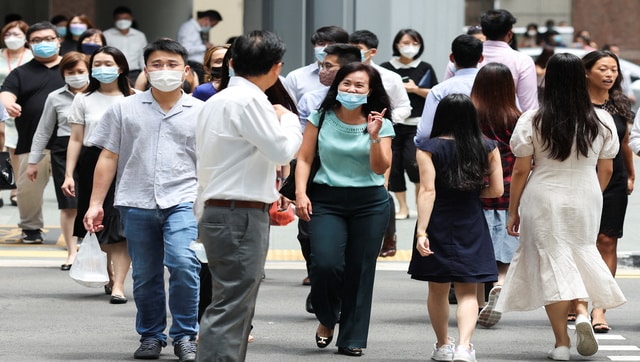Covid-19 has reared its ugly head again. Many regions in Asia, including Singapore and Hong Kong, are reporting a surge in cases driven by variants linked to the JN.1 strain.But what is this JN.1 variant? And as Singapore, Hong Kong, China, and Thailand grapple with a rise in cases of coronavirus, should India worry?Let’s take a closer look.Covid-19 spreads in AsiaSingapore has recorded thousands of new
Covid-19
infections in recent weeks.As per estimates, the city-state witnessed 14,200 cases in the week ending May 3, compared to 11,100 cases in the week before. The Ministry of Health (MOH) and the Communicable Diseases Agency (CDA) said that the average daily hospitalisation jumped from 102 to 133 during this period.STORY CONTINUES BELOW THIS ADHowever, the average daily admissions to the Intensive Care Unit (ICU) fell from three to two cases.Office workers go for lunch at the central business district on the first day free of coronavirus disease (COVID-19) restrictions in Singapore, April 26, 2022. File Photo/ReutersHong Kong is also reporting a surge in Covid-19 infections. The spread of coronavirus is “quite high”, with the percentage of respiratory samples testing positive for Covid-19 reaching a one-year high recently, as per the Centre for Health Protection.More from Health
Joe Biden diagnosed with prostate cancer: How serious is he?
Blood test to diagnose Alzheimer’s gets approval in USThe Chinese Center for Disease Control and Prevention (China CDC) said that the Covid-19 test positivity rates more than doubled over a five-week period ending May 4.Cases of coronavirus have also increased in Thailand, especially since the Songkran festival in April.What’s causing the Covid spike?In Singapore, health authorities have blamed LF.7 and NB.1.8 — both descendants of JN.1 variant, a sub-lineage of the Omicron variety — for the spike in Covid-19 infections.They said that the two variants together make up for two-thirds of the locally sequenced cases. The authorities said the rise could be due to waning immunity among the population to the Covid infection.“There is no indication that the variants circulating locally are more transmissible or cause more severe disease compared to previously circulating variants,” Singapore’s health ministry said.Editor’s Picks1Covid cases rise in Singapore, Hong Kong as new wave spreads in Asia. Should you be worried?2What are ‘FLiRT’ variants of COVID-19 that are on rise in US?JN.1 variant and its dangersJN.1
is a descendant of the BA.2.86, also known as ‘Pirola’ strain. This subvariant of coronavirus was first detected in Luxembourg in August 2023. At the time, the World Health Organization (WHO) classified the strain as a ‘variant of interest’.Its symptoms are similar to those of other Covid-19 strains, such as sore throat, fever, dry cough, fatigue, runny or blocked nose, headache, loss of taste or smell, muscle pain, conjunctivitis, and diarrhoea. Some people may also experience mild gastrointestinal issues.According to one of India’s top doctors, Rajeev Jayadevan, JN.1 can evade immunity and is more transmissible.STORY CONTINUES BELOW THIS AD“JN.1 is a severely immune-evasive and fast-spreading variant, markedly different from XBB and all other prior versions of this virus. This enables it to infect people who had previous Covid infections and also people who were vaccinated,” he reportedly said in 2023.JN.1 has since evolved to spread more effectively, as per Johns Hopkins University, a US-based varsity. But do Covid-19 vaccines work against this Omicron variant?According to WHO, the XBB.1.5 monovalent booster, a Covid-19 vaccine developed to target the XBB.1.5 subvariant of Omicron, has been shown to provide protection against the JN.1 variant.Should India worry?India has a total of 257 active Covid-19 cases as of May 19, according to the Ministry of Health and Family Welfare.There has been a slight rise in mild cases, particularly among younger people, in Mumbai. However, this does not signal a new wave, reported News18. Experts warn that this resurgence of coronavirus in other parts of Asia could also occur in India. “The recent surge in countries like Hong Kong and China is being linked to waning antibodies, and the same could hold true for India,” Dr Vikas Maurya, Senior Director and Head of Pulmonology at Fortis Shalimar Bagh, told ET HealthWorld.STORY CONTINUES BELOW THIS AD“It is possible that India might see a similar spike. In China, the rise in cases is attributed to decreased antibodies or immunity over time — the same could happen here. Many people in India were vaccinated a long time ago. If their immunity has dropped, more individuals could catch and spread the infection,” he added.Dr Sandeep Budhiraja, Group Medical Director, Max Healthcare, questioned the timing and spread of JN.1 variant. “What is disturbing is that this wave is increasingly affecting populations in Southeast Asia during the summer months — a time when respiratory viruses typically don’t peak,” he said.With inputs from agenciesTagsCOVIDEnd of Article
Credit –
What’s behind the Covid-19 surge in Asia? Will vaccines work?




